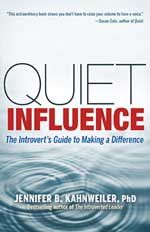Persuasion
Introverts and Influence: A Dynamic Duo
Insights for raising your quiet influence quotient
Posted January 10, 2014

Introverts and influence aren’t two words that you normally think of in the same blink. Yet, Jennifer Kahnweiler, Ph.D., in her book Quiet Influence, turns that misconception on its head. What can you learn about influencing others without necessarily making a peep? Check out the following exchange that Kahnweiler and I had on Twitter. An executive coach who speaks internationally, she is also the author of The Introverted Leader and has been recognized as a “champion for introverts.” As an introvert, I appreciate Twitter because I get to think before I tweet, and I enjoy doing so in 140-character bursts. Conversely, Kahnweiler says that she appreciates being forced to think before she tweets and being succinct, two challenges for her as an extrovert.
NA: In Quiet Influence you show that introverts can be highly effective influencers without acting like extroverts. How?

JK: By making the most of their natural, quiet strengths. So much more impactful when they do that!
NA: Agreed. How do you define influence, and what is “quiet influence”?
JK: Make a difference: challenge the status quo, provoke new ways of thinking, effect change or inspire others to move forward.
JK: Big, vibrant personalities are not necessary ingredients. The quieter, more thoughtful voice often speaks the best ideas.
JK: QI folks acknowledge and tap into their internal energy to engage with the outside world. Ex.: think first, talk later :)
NA: Thinking first, talking later is a strong introvert need.
JK: Organizations don't often respect the need for introverts to think first. Bias toward action and against reflection. Agree?
NA: Indeed. We live in an action-oriented time and culture.
JK: Yes! But slowly things are changing as we thankfully see the “Rise of the Introverts!”
NA: You talk about QIQ, or the Quiet Influence Quotient. How can you increase your QIQ?
JK: By considering your influencing challenge and thoughtfully applying these strengths. Charting progress is cool!
JK: There is more than one way to have some sway. We can make a great impact by using the strengths of Quiet Influence.
JK: 6 strengths: Quiet Time, Preparation, Engaged Listening, Focused Conversations, Writing and Thoughtful Use of Social Media.
JK: I's move into having focused conversations where they put forth their point of view. Listen and talk.
JK: If you have to sell an idea try writing an email AND having a focused conversation. The strengths work well together.
NA: Peanut butter and chocolate. Eh?
JK: Absolutely! Or cream cheese and bagels.
NA: Yes, and an introvert might like to have those quietly, at her desk, or while influencing one key stakeholder over lunch.
JK: Food, like laughter, is a relationship builder :)
NA: Yes. Food is a universal way to bring people together.
NA: And you talk about the downside of overusing quiet strengths too.
JK: Asking too many questions when listening can be seen as not being competent or confident. Agree?
NA: Yes. That can result in the appearance of nervousness or sounding "junior" rather than authoritative.
JK: Quiet time can be overused and lead to a lack of motivation and lost opportunities. Not good for influencing :(

NA: So it sounds as if introverts need to strike the right balance between quiet and social time, depending on their goals.
JK: Yes! And it varies from person to person, place to place, "Know thyself" is the catch phrase here.
JK: I's are always having to adapt to E's. By borrowing from the QI playbook of embracing solitude, great things can happen!
NA: Yes. Too much people time is like Kryptonite for introverts. We need those breaks for reflecting for our best contributions.
JK: By the way, extroverts are grabbing the idea of quiet time and running with it. Running phrase fits right?
NA: Indeed. Can you give examples of individuals you consider to be quiet influencers?
JK: Famous QI folks: Tim Cook (Apple CEO), Janet Yellen (new Federal Reserve head), Steve Wozniak, Doug Conant, Warren Buffett. Many more!
JK: Even more important are the millions of “QI'rs” across countries, industries and fields who make a difference every day.
NA: So how can introverts communicate their messages at noisy meetings where they struggle to get in a word edgewise?
JK: Meetings are a HUGE challenge for I's. Use the 1st P on the 4 P's Process*: PREPARE. Know questions to ask, rehearse their comments.
NA: Indeed. And those conversations can happen in person or virtually.
JK: Yes. Social media is a boon for QI's who can decide when and how they respond. It is a great tool to increase influence.
NA: Yes. Social media is lovely for introverts because, at least in its written forms, we can reflect before hitting "send."
JK: Social media moves people to action (ex.: Arab Spring) and helps Quiet Influencers achieve visibility and builds relationships.
JK: The best QI'rs are givers on social media and do (as you say) post quality content!
NA: Thank you for posting your quality content today.
NA: What trends indicate that now is the time for quiet influence? You mention flattened organizations as one example in your book.

JK: You must communicate key messages to a complex web of vendors, suppliers, customers in and out of the organization.
JK: Other influencing styles work better globally.
JK: I really appreciate the chance to get to know you and dialogue on the rise of introverts and quiet influence.
NA: Thank you for our chat and for writing your book, which has lots of great concrete advice for Is and insights for Es too.
JK: I appreciate the incredible work you do to tell the introvert story. A pleasure to connect.
*“The Four P’s Process of Leadership Success,” originally described in the Introverted Leader: Prepare, Presence, Push, Practice.
Edits were made to the Twitter exchange above for clarity.
© Copyright 2014 Nancy Ancowitz




